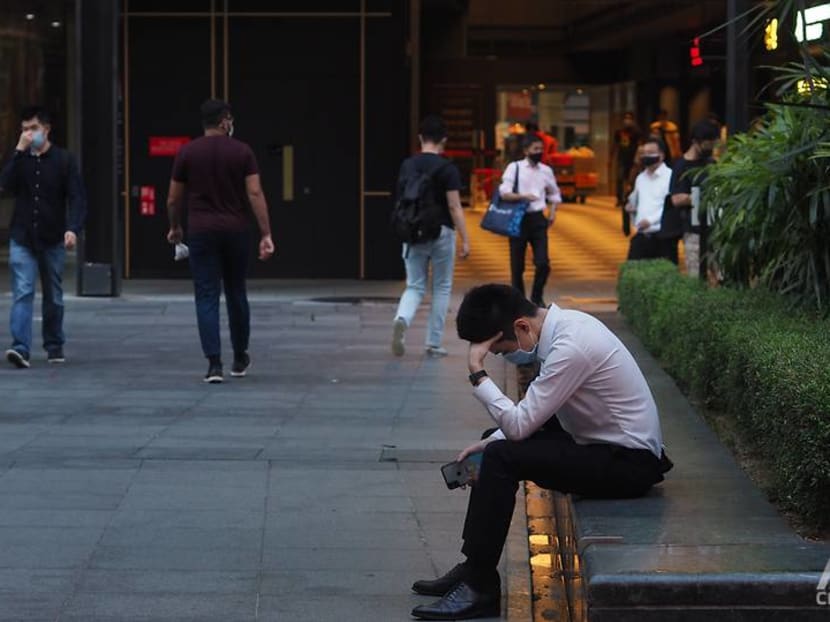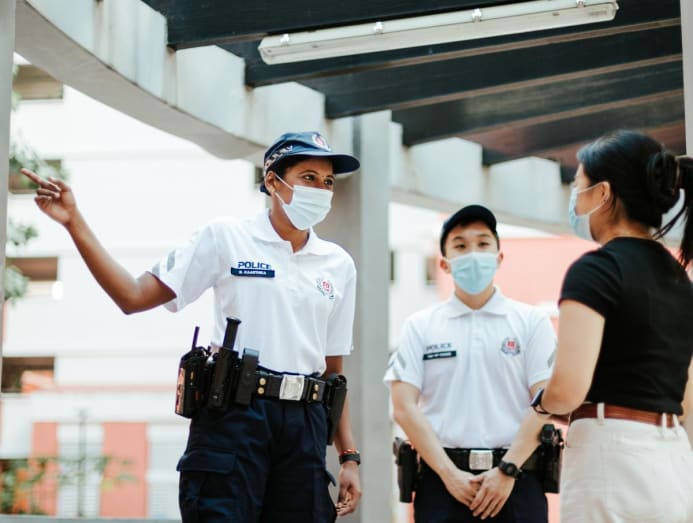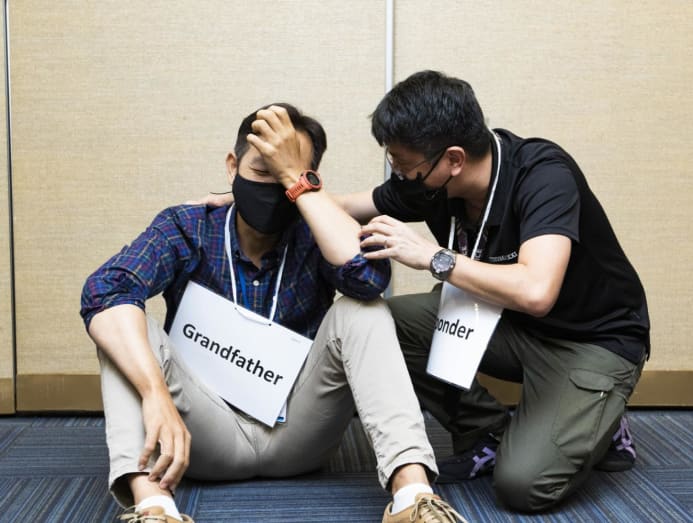Police partnering IMH crisis response team to better help cases of attempted suicide

SINGAPORE: The police in early 2021 responded to a case of a disturbance involving a couple at home. The wife eventually told officers she wanted to end her life due to problems in the marriage.
Officers called an Institute of Mental Health (IMH) crisis response team and gave details of the case. The psychiatric nurse said over the phone that the woman should be taken to IMH for an assessment. It would be too risky to let her remain at home alone with her husband, who is the trigger, the nurse said.
But the woman and her husband refused, so the team was activated to do the assessment on site. Two IMH nurses found the couple in “great emotional distress”, an IMH official told reporters during a media briefing for the Police Workplan Seminar on Friday (Apr 22).
“My nurses actually managed to convince both of them to come down to the hospital for assessment,” said Dr Jared Ng, chief of IMH’s department of emergency and crisis care.
This approach is part of a police partnership with IMH, piloted in March 2021, to better ensure cases of attempted suicide get the right kind of help more quickly.
Attempted suicide was decriminalised at the start of 2020. Dr Ng noted that the focus has “very much shifted” to healing, recovery and getting rid of the stigma related to suicide and the criminal justice process.
“In the past, when the person attempted suicide, we arrested them, brought them back to the police station and after that they might be brought to IMH, and that process takes a long time,” he said.
“And if this person was mentally ill, I think that it is really not very fair to the patient, not very patient-centred. The person would already be in distress, and we have got a lot of feedback that their condition got worse because of the experience that they had.”
Under the new approach, police officers attending to a case with signs of attempted suicide – without it being attempted – can call a dedicated hotline manned 24 hours by IMH nurses and counsellors.
This IMH crisis response team will be briefed by officers and can speak to the distressed person and their caregiver over the phone to conduct a suicide risk assessment. This includes questions about their mental state and circumstances around the planned act.
“We want to establish a safety plan, whether it's safe to discharge the person to the caregivers, friend or things like that,” Dr Ng said, adding that the team can also check the person’s medical records if they were an IMH patient.
“After that, when we are reasonably sure that it is safe, then we will advise the police to release the person back to the caregiver. If we think that the risk is too high and the person will necessitate a more thorough psychiatric evaluation, we will actually advise police to convey them to IMH where we will do the evaluation.”
This process would only apply to cases where, for instance, the person had sent a text saying they wanted to end their life. If the person is already standing on a ledge or has hurt themselves, the priority for police is to secure their safety.
Singapore reported 452 suicides in 2020 – the country's highest count since 2012 – amid the isolation and psychological distress due to the pandemic, according to the latest figures from the Samaritans of Singapore.
The IMH crisis response team gets about eight to 10 calls a day on the police hotline. It is manned by six nurses and 14 counsellors who are also in charge of IMH’s own crisis hotline.
The team was piloted at the two police land divisions of Bedok and Jurong with encouraging results and expanded islandwide in December 2021, said Superintendent of Police (SUPT) Tan Yong Liang, assistant director, frontline policing division, operations department.
Out of the more than 2,000 calls police made to the crisis response team, 14 were on-site activations, police said.
In more than 80 per cent of the remaining cases, the team’s advice was to take the individuals to the IMH emergency room. This was due to reasons like suicide risk, need for further treatment of underlying mental health conditions, or a lack of adequate supervision and care at that point in time.
The rest received other forms of intervention, including being referred to other hospitals’ accident and emergency department, or being discharged back to their caregivers after the IMH team made safety plans involving the individuals and their caregivers.
Dr Ng acknowledged that IMH is still associated with some stigma, although he said this has “been reduced” over the years.
“Caregivers, patients will fight not to come to IMH, because they don’t want the record. So in those cases, we then deploy very experienced psychiatric nurses to the scene where the police will also be there, and then we do the assessment there,” he said.
“The assessment there will evaluate the risk, whether there’s presence of an illness or whether there are further things we can do, like conveyance to a general hospital. At all times, the nurses and counsellors will have access to the specialist on duty at the hospital, where they will discuss the case or what to do with the patient.”
The help does not end here. Crisis response team counsellors continue to check in on the individuals via phone calls or home visits if necessary, until they are handed over to the next care provider, police said.
For example, in the case of the distressed couple, they were referred for marital counselling, Dr Ng said.
While the crisis response team can only go on scene if a caregiver is present, SUPT Tan said the police and IMH are looking at how this requirement can be removed sometime this year. This would allow low-risk cases to be discharged on scene without their caregiver present.
With the number of on-site activations expected to go up, Dr Ng hopes IMH would get more manpower, highlighting that it is not easy to recruit staff for the crisis response team. These nurses need to be experienced, clinically sound and be able to show “great empathy”.
“We are looking to expand to include (deploying) our counsellors as well, but again if I deploy counsellors, it means I have fewer people manning the (IMH and dedicated police) lines, so we have to balance between the requirements,” he added.
HANDLING OF FAMILY VIOLENCE CASES
Also as part of the workplan seminar, the police announced that from June, they will appoint family violence community policing officers across the seven land divisions to improve victim care in cases of family violence.
These officers, who come from the Community Policing Unit, will specialise in the management of family violence cases and escalate potential high-risk cases to social service agencies for early intervention.
“The (officers) will also be the main point of contact between the social service agencies and involved parties in the family to provide a more coordinated support network to the victims, and an efficient information sharing process,” police said.
“This close collaboration with the social service sector will enable agencies to have a more comprehensive understanding of family violence, and to provide a holistic and upstream approach to family violence intervention.”

This comes amid a “steady increase” in the number of inquiries and reports of family violence since the pandemic started, said Ms Tabitha Ong, director of the adult protective service rehabilitation group at the Ministry of Social and Family Development (MSF).
“The timely response and appropriate responses by the police officers, who are usually the first responders, and social service professionals can help break the cycle of family violence,” she said.
But the nature of family violence cases is multifaceted and often rooted in complex underlying issues, police said, adding that enforcement and prosecution may not always be the “optimal solution” to address the root cause of such violence.
This is why the police have since 2021 co-led a workgroup with MSF, family service centres, the Singapore Council of Women’s Organisations and crisis shelters to develop a training package for officers dealing with family violence cases.
The scenario-based learning model reinforces the soft skills required to better engage victims and survivors, and includes recognising the signs of family violence based on victims’ responses and the underlying psyche, police said.

While this training used to vary across the police land divisions, the curriculum will now be standardised to consolidate the best practices. This includes using standard terms like “escalation”.
“Now that we're standardising the syllabus, I could call the community policing team and tell them that in this case flagged up to me, I'm very worried about the escalation,” Kreta Ayer Family Services centre director Katherine Baptist said.
“The survivor is giving us signs and telling us that her husband is controlling her, he's not allowing her to go out. Can we conduct a joint home visit and see what's happening? In one specific situation, we were able to do that and we then created a safety plan to get her out of the hole.”
When it comes to investigations, the police will also form a dedicated specialist investigation team for family violence. This will be part of the new Sexual Crime and Family Violence Command, to be set up by 2023.
The family violence investigation officers will be equipped with specialised skillsets to better handle familial issues, and to better engage and manage victims of abuse during investigations, police said. They will only take on family violence or sexual crime cases.
“These officers will also undergo specialised training in legislation related to family violence, and work with social service agencies to better understand social service interventions and community resources that protect the vulnerable,” police added.









